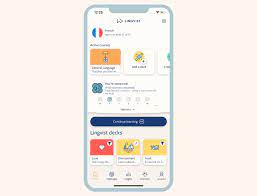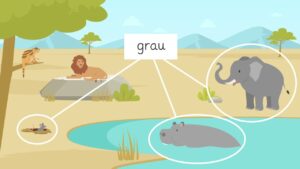German Short Stories
Do We Even Need to Read in German?
Whether you're learning German, Spanish, or French, short stories are a great way to polish your language skills. It especially holds true for visual learners, who memorize new vocabulary better when they see it than when they hear it in a foreign language. German abounds in amusing stories (Schwänke), folk fairy tales (Märchen), and Erzählungen. I’m sure you’ve read some in the English translation, but rereading them in their original version is quite a different experience.
Our native German language instructor Birgit and her American student Alex welcome you all to their German language lessons that unveil the potential of various German stories for beginners and to encourage you to practice reading in the original language instead of using English translations. They’ll be focusing on three categories of easy German short stories:
- folk stories for kids (Märchen)
- short stories by German writers (Erzählungen and Novellen)
- non-fiction stories for beginners.
Märchen: from Rapunzel to Rottkläppchen
- Es war einmal: So fangen Märchen an. Hello Alex. Today’s course lesson will be devoted to German short stories for beginners and intermediate learners.
- Hi Frau Birgit. I know I don’t look like a responsible adult, but... fairy tales? Seriously?
- Why not? You'll need them when you finally strike gold with your flirting sprees, get married to a German woman, and have bilingual kids.
- Can you read future?
- Yeah. Jokes aside, such stories are great language learning material. Some say classic fairy tales are filled with archaic German vocabulary, so there's no point using them. However, the Internet abounds with updated versions, accompanied by lists of useful vocabulary, comprehension questions, and quizzes to check your understanding of a German story you've just read. What's more, these are mostly free web resources.
- Still not convinced it's going to be fun.
- Let me show you. Here’s a great website with shortened classic tales like:
- "Rotkäppchen" / "Red Riding Hood"
- "Rapunzel" / "Rapunzel"
- "Schneewittchen und die 7 Zwerge" / "Snow White and the Seven Dwarfs"
- "Die Bremer Stadtmusikanten" / "The Bremen Town Musicians"
- "Hänsel and Gretel" / "Hansel and Gretel"
- Oh, Hansel and Gretel used to be my bedtime read.
- Nostalgia. On this website, all the written stories are accompanied by audio files. You’re learning new vocabulary and making a listening drill simultaneously. If you doubt these are indeed easy German stories, see these simplified sentences I picked from one:
Jetzt sind Hänsel und Gretel allein im Wald. Hänsel und Gretel sind sehr müde. Und Hänsel und Gretel schlafen ein. Es ist dunkle Nacht.
- Yeah, that’s pretty much at my level.
- Spitze! Now, you can find most of the German fairy tales turned into videos on YouTube:
Example #1

- Perfect for Friday nights at home. Is it fine to be having a beer while watching kids’ cartoons and learning German?
- Just make sure people don't see you doing that because they might have quite a few questions. But as long as it’s deutsche Sprache, Bier und Zeichentrickfilme, Alex.
- As long as it's easy German...
- You can also visit the free online Amira reading program or The Fable Cottage and Einfach Vorlesen websites. They feature classic and new stories that are great for language learning.
FAQ: What fairy tales came from Germany?
Germany is a country of fairy tale castles and characters known around the world: "Red Riding Hood" ("Rotkäppchen"), "Rapunzel" (Rapunzel), "Snow White" (Schneewittchen), "Cinderella" (Aschenputtel), and "Sleeping Beauty" (Dornröschen" to name just a few. It is also the birthplace of the Grimm Brothers, the most prominent fairy tale authors and collectors.
Erzählungen und Novellen: From Kafka to Hesse
- To make sure you don’t get bored with children's stories and all the vocabulary for animals and princesses, I’ve also prepared a collection of German short story writers for adults.
- Gott sei dank!
- Your Subjunctive is melting my heart, Alex!
- Ich bin ein braver und fleißiger Student, remember?
- And these adjective endings… You speak German perfectly, Mr. Knowledge. Quick: name five German-speaking writers!
- Oh, panic. Goethe, Hesse, Mann... I'm out. Kafka, perhaps? Schnitzler? Were they German?
- Well, Franz Kafka was Czech, Bohemian to be historically accurate.
- Oh, that's nice. I like to think I'm a bohemian myself!
- No. Kafka, was a Bohemian. As in, from Bohemia.
- Isn't that a beer brand?
- Yes, you high-functional alcoholic. It's also a region of present-day Czech Republic which, back in Kafka's time, was part of the Austro-Hungarian Empire. The point is, Kafka was not German, but he did write in German. Same for Arthur Schnitzler, who was Austrian.
- Look at me. I’m a connoisseur.
- Indeed. As a German native speaker, I would recommend these top five writers for their Erzählungen und Novellen. Don't feel obliged to only read these short stories, though. I'm sure you'll enjoy others too:
- E.T.A. Hoffmann – "Der Sandmann" / The Sandman
- Thomas Mann – "Tristan" / Tristan
- Franz Kafka – "Das Urteil"/ The Trial
- Arthur Schnitzler – "Lieutenant Gustl" / Lieutenant Gustl
- Herman Hesse – "Wenn der Krieg noch zwei Jahre dauert" / If the War Lasts For Two More Years
- Reading these stories must be quite challenging. Is there a Youtube colorfully animated version of "The Trial"?
- I’ve predicted this, Mr. Lazybones. There are a bunch of free YouTube videos with marvelous animation for the most popular German stories, featuring useful German vocabulary. Check Der Sandmann for beginners, for instance:
Example #2

- I love this one. I wish I had had a similar story channel in English for my school must-read list.
- Yeah, it's a treasure for anyone who's learning German! I’d still recommend combining listening and reading. If you lack the confidence to read in the original version, start with a German-English parallel story, like this anthology - German Stories/Deutsche Erzahlungen: A Bilingual En Face Anthology.
- Hmm... Won’t I be distracted by tracking a story in two languages?
- You can try it this way: read a story in English. Then go to the German version. You’ll understand more and only look up some vocabulary in a dictionary.
FAQ: Who is the most successful German author of all time?
Germany can boast of many great fiction authors ad poets. Everyone knows Johann Wolfgang von Goethe, Thomas Mann, and Herman Hesse. However, judging by the number of book copies sold around the world, the most prominent German writer is Erich Maria Remarque. His widely enjoyed war books include "Drei Kameraden"(Three Comrades), "Arc de Triomphe" (Arch of Triumph), and "Im Westen nichts Neues" (All Quiet on the Western Front).
Non-Fiction for Language Learners
- Now, if you’re not a big fan of fiction…
- I wouldn’t dare to confess that to a bookworm like you, Frau Birgit.
- Does a chapter a day make me a bookworm?
- If it's a "War and Peace"-length chapter, yes.
- Anyway, you need all kinds of German vocabulary. The poetic language of folk tales, refined phrases of fiction, and colloquial expressions of learners’ texts all do their job in this sense.
- Yeah. I’ll hardly be reading a kid's story while drinking my morning coffee. Are there any political German stories for me?
- Great you’ve asked. I have two intermediate-level news resources, although they can also be used by beginners: Nachrichtenleicht and NDR. They're the CNN for German language learners. Zeitsprachen, in turn, is a digital magazine focused on the German-speaking world exclusively. All these are useful if you're looking to improve grammar, vocabulary, and structure of sentences. You can also listen to the news on News in Slow German so you can take a break from written stories.
- Sounds fancy. Engaging with real news, like a native German speaker.
- Alternatively, get yourself one of the short stories for beginners on this website or this book with easy words and elementary grammar. Finally, YouTube is full of podcasts for German learners in simplified language. Check this one, for instance:
Example #3

Ich arbeite jetzt von zu Hause aus und gehe nicht mehr ins Büro. 01:02 - 01:10
- Gee, so many fun resources and so little time. You know I still have a life outside our German course, right?
- Do you? Look at you, Mr. Social. Well, then plan your time wisely. By the way, make sure you finish one short story by Hesse and a few pieces of news to discuss next time.
- It was such a great lesson just till now… Kidding! Danke, Frau Birgit! Bis nächstes Mal!
- Ciao, Alex!
- Oh, I didn't know ciao was a German word! Ciao, Frau Birgit!
- Facepalm.
FAQ: Where can I read news from Germany?
If you want to polish your German while staying updated on what's going on in the world, check one of these fantastic websites: Nachrichteleicht, Deutsche Welle, and News in Slow German. These are great resources even if your level is A2-B1.
How to Get the Most of German Short Stories?
Language learning is a complex process that requires much time and effort. At the same time, German stories should be fun, not an endeavor. When you resort to a story in the original, never engage in your usual intensive reading activity (where you'd look up every word). With short stories, opt for extensive reading – emulate how you do it in English or English translation. Indulge in the aesthetic pleasure that you get from the story and focus on the overall meaning rather than separate words. Finally, remember these tips from Birgit:
- Stay motivated and only pick stories you find interesting
- Read regularly and avoid translation where there's an original edition
- Summarize the stories you’ve finished orally in front of a mirror
Alex has already embarked upon a new story and says it's interesting. Why don’t you join him? Follow his language learning experience and his teacher’s motivating approach for more German content.






